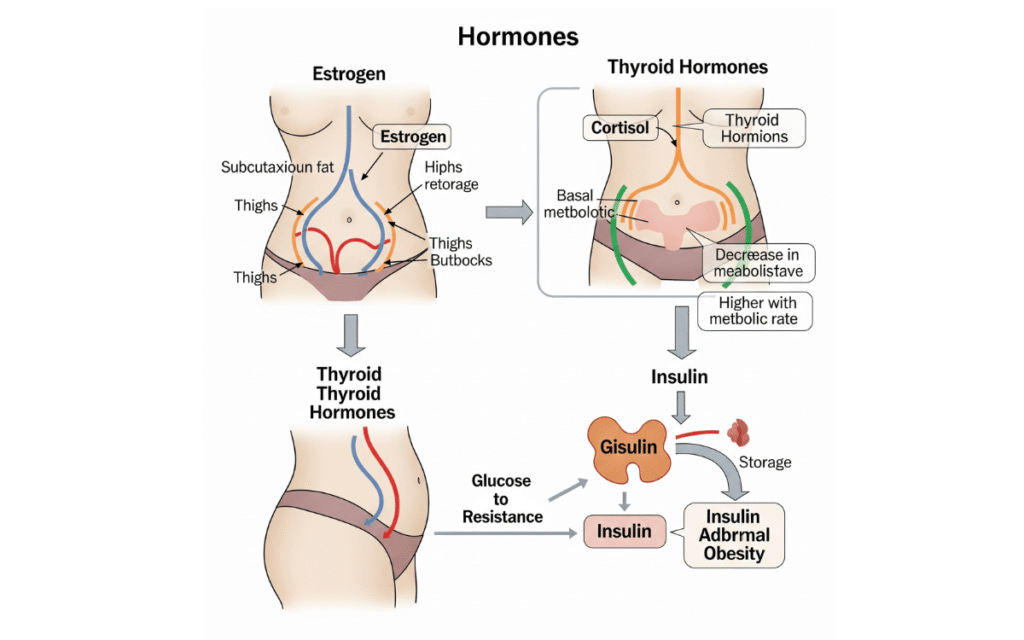Introduction
Struggling with stubborn weight after 40, despite diet and exercise? You’re not alone. Hormones and weight loss over 40 are deeply connected, and many women face unexpected challenges during perimenopause and menopause.
As a midlife women’s health strategist with over 10 years of experience, I’ve helped thousands understand the real reason weight won’t budge: hormones.

In this data-backed guide to hormones and weight loss over 40, you’ll uncover:
- The science behind hormonal weight gain after 40
- How estrogen, cortisol, thyroid, and insulin shape your metabolism
- What treatments (including HRT & GLP-1 meds) are proving effective in 2025
- Step-by-step lifestyle strategies to regain metabolic control and support long-term weight management
According to the WHO menopause fact sheet, over 1.1 billion women worldwide will be in menopause by 2025. Let’s decode your hormones and help you reclaim your health with science on your side.
What Are Hormones and Weight Loss Over 40?

As women transition through their 40s and beyond, hormonal and metabolic shifts begin to significantly affect fat storage, appetite, body composition, and muscle tone. The term “hormones and weight loss over 40” refers to the impact of declining reproductive and metabolic hormones, notably estrogen, progesterone, testosterone, thyroid hormones, insulin, cortisol, leptin, and ghrelin, often known as the hunger hormone.
Declining estrogen levels contribute to visceral fat accumulation, insulin resistance, and mood instability. At the same time, elevated cortisol can promote abdominal weight gain and cravings, especially under chronic stress [Mayo Clinic: Stress effects].
Simultaneously, muscle mass declines by 1–2% annually from midlife onward—a condition known as sarcopenia [NIH, 2022]. This loss reduces basal metabolic rate (BMR), making it easier to gain weight and harder to lose it, even with regular exercise.Chronic stress also elevates cortisol, which worsens insulin sensitivity and drives abdominal fat accumulation.
Hormonal Red Flags and Real-Life Weight Gain Patterns

Common complaints from women over 40 include:
- Sudden belly fat despite no dietary changes
- Fatigue, low energy, or mood changes
- Cravings or emotional eating
- Difficulty sleeping or recovering from workouts
- Unexplained weight fluctuations without lifestyle change
These are signs of biological adaptation, not personal failure or lack of effort to maintain a healthy weight.
These physiological changes not only impact your weight, they also affect how your body processes food, responds to exercise, and manages energy.
Why Hormones and Weight Loss Over 40 Matters in 2025
The Menopausal Weight Gain Epidemic
- Over 1.1 billion women will be in menopause by 2025 [WHO menopause fact sheet]
- Women gain 1–1.5 kg/year on average during the perimenopausal transition.
- Visceral fat can double from 5–8% to 10–15% of total weight by menopause [Journal of Clinical Endocrinology & Metabolism, 2023]
- Muscle mass declines 1–2% annually from midlife onward [NIH, 2022]
These shifts increase the risk of health issues like cardiovascular disease, insulin resistance, and changes in body mass index (BMI).
2025 Breakthroughs in Hormone-Based Weight Management
- GLP-1 receptor agonists (e.g., semaglutide, tirzepatide) reduce weight by 15–24% in adults with obesity [NEJM semaglutide study]. These medications work by mimicking the GLP-1 hormone to regulate appetite, improve insulin sensitivity, and promote sustained fat loss.
These shifts mark a new era of evidence-based care that prioritizes hormone-aware strategies for women in midlife.
Step-by-Step Guide to Reversing Hormonal Weight Gain After 40
1. Test Your Hormones
Request lab work that includes:
- Estrogen, progesterone, testosterone
- TSH, Free T3, Free T4
- Cortisol (AM/PM), DHEA
- Insulin, glucose, leptin, ghrelin
The North American Menopause Society recommends hormone testing for any woman experiencing unexplained weight gain, fatigue, or metabolic dysfunction [NAMS Clinical Practice Materials].
2. Prioritize Resistance Training

- 2–4 full-body sessions per week
- Focus on compound movements (squats, rows, pushups)
- Use progressive overload to build lean mass
Resistance training preserves muscle, supports glucose regulation, and slows the metabolic decline associated with aging [NIH, 2022]. Staying physically active also improves insulin sensitivity and helps maintain a healthy weight.
3. Follow a Hormone-Friendly Diet

- 25–35g of protein per meal
- Healthy fats (olive oil, salmon, avocado)
- Fiber-rich carbs (beans, veggies, oats)
- Anti-inflammatory foods (flax, berries, greens)
A 2024 meta-analysis in The Journal of Nutrition & Aging found that balanced, protein-rich diets help preserve lean mass and reduce fat gain during menopause. Adequate nutrition plays a role in regulating hunger signals and stabilizing blood pressure.
4. Lower Cortisol & Improve Sleep

- 7–8 hours of sleep per night
- Practice meditation, journaling, or low-intensity walking
- Reduce caffeine and screen time before bed
According to the Mayo Clinic’s stress and weight article, chronic stress elevates cortisol, which plays a role in abdominal fat accumulation, insulin resistance, and poor sleep, each of which can lead to weight gain.
5. Consider Medical Therapy (When Needed)
- HRT may help reduce visceral fat and preserve lean muscle mass, especially when combined with strength training, but it’s not designed as a standalone weight-loss treatment and carries individualized risks
- GLP-1s are FDA-approved and highly effective, but may cause GI effects and don’t work for everyone.
Always work with a hormone-literate provider to assess risks, benefits, and whether an underlying medical condition may be interfering with weight loss progress.
What hormone causes rapid weight loss?
Low levels of thyroid hormones (T3, T4) or overproduction due to hyperthyroidism can lead to unexplained weight loss. However, serious underlying health problems or malabsorption disorders should always be ruled out.
Why am I suddenly losing weight in my 40s?
Sudden weight loss may be linked to thyroid dysfunction, digestive disorders, or hormonal imbalance. It’s important to consult a provider and rule out medical conditions.
How to balance hormones for weight loss over 40?
Support estrogen, thyroid, and insulin balance through sleep, strength training, protein-rich meals, stress reduction, and functional lab testing. Work with a practitioner trained in hormone therapy.
How can I jumpstart weight loss after 40?
Prioritize resistance training, sleep, high-protein meals, and consider personalized therapies like HRT or GLP-1s. Avoid aggressive dieting or extreme cardio.
What does a menopause belly look like?
A menopause belly often presents as increased subcutaneous fat around the waist and deeper visceral fat, which may elevate body mass index (BMI) and increase cardiometabolic risk.
What are the three hormones to activate weight loss?
Insulin, leptin, and GLP-1 are key in appetite control and metabolism. Resetting these hormones through diet, sleep, and medication when needed helps with maintaining a healthy weight.
Conclusion: Science, Strategy & Self-Compassion
Hormones play a major role in your body’s ability to gain or lose weight after 40. From rising visceral fat and declining muscle mass to thyroid and cortisol disruptions, the deck often feels stacked. But there is hope—and evidence.
By combining hormone testing, resistance exercise, targeted nutrition, and appropriate therapies, you can take back control of your metabolism and well-being.
Most importantly, know this: Midlife weight gain is not your fault—and it’s not permanent.
Whether you’re navigating perimenopause or postmenopause, staying informed and guided by trusted experts is your greatest ally in long-term weight management and whole-body health.